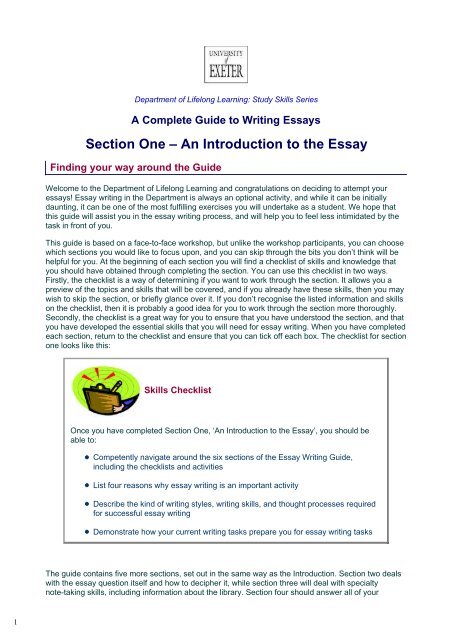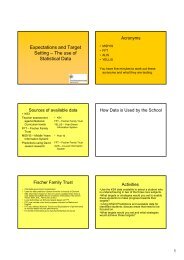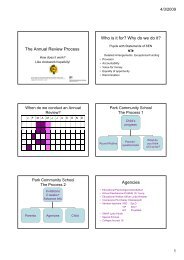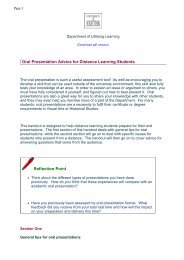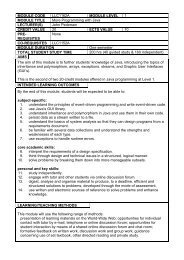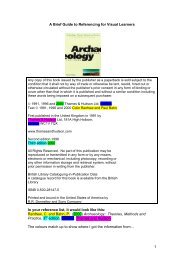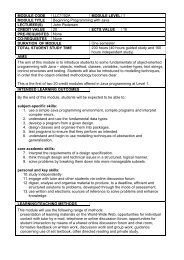DLL Study Skills Series: Essay Writing
DLL Study Skills Series: Essay Writing
DLL Study Skills Series: Essay Writing
Create successful ePaper yourself
Turn your PDF publications into a flip-book with our unique Google optimized e-Paper software.
Department of Lifelong Learning: <strong>Study</strong> <strong>Skills</strong> <strong>Series</strong><br />
A Complete Guide to <strong>Writing</strong> <strong>Essay</strong>s<br />
Section One – An Introduction to the <strong>Essay</strong><br />
Finding your way around the Guide<br />
Welcome to the Department of Lifelong Learning and congratulations on deciding to attempt your<br />
essays! <strong>Essay</strong> writing in the Department is always an optional activity, and while it can be initially<br />
daunting, it can be one of the most fulfilling exercises you will undertake as a student. We hope that<br />
this guide will assist you in the essay writing process, and will help you to feel less intimidated by the<br />
task in front of you.<br />
This guide is based on a face-to-face workshop, but unlike the workshop participants, you can choose<br />
which sections you would like to focus upon, and you can skip through the bits you don’t think will be<br />
helpful for you. At the beginning of each section you will find a checklist of skills and knowledge that<br />
you should have obtained through completing the section. You can use this checklist in two ways.<br />
Firstly, the checklist is a way of determining if you want to work through the section. It allows you a<br />
preview of the topics and skills that will be covered, and if you already have these skills, then you may<br />
wish to skip the section, or briefly glance over it. If you don’t recognise the listed information and skills<br />
on the checklist, then it is probably a good idea for you to work through the section more thoroughly.<br />
Secondly, the checklist is a great way for you to ensure that you have understood the section, and that<br />
you have developed the essential skills that you will need for essay writing. When you have completed<br />
each section, return to the checklist and ensure that you can tick off each box. The checklist for section<br />
one looks like this:<br />
<strong>Skills</strong> Checklist<br />
Once you have completed Section One, ‘An Introduction to the <strong>Essay</strong>’, you should be<br />
able to:<br />
Competently navigate around the six sections of the <strong>Essay</strong> <strong>Writing</strong> Guide,<br />
including the checklists and activities<br />
List four reasons why essay writing is an important activity<br />
Describe the kind of writing styles, writing skills, and thought processes required<br />
for successful essay writing<br />
Demonstrate how your current writing tasks prepare you for essay writing tasks<br />
The guide contains five more sections, set out in the same way as the Introduction. Section two deals<br />
with the essay question itself and how to decipher it, while section three will deal with specialty<br />
note-taking skills, including information about the library. Section four should answer all of your<br />
1
questions about the structure and presentation of your essay, and section five shows you to how to<br />
use the Harvard referencing system. Section six is probably the most important section; you’ll learn<br />
about how to submit your essays and the marking system used here at the Department. You will also<br />
learn about the type of feedback you’ll receive from your tutor, and how to use this feedback to your<br />
advantage.<br />
Much of this guide is filled up with instructions, lists and information. However, there are many<br />
activities scattered throughout the guide. The activities fall into two main types: reflection activities and<br />
action points. Reflection activities ask that you think about your own situation and may ask you to write<br />
down your experience or thoughts. Reflection activities can be used as a starting point if you wanted to<br />
keep a learning journal. (If you want to know more about keeping a learning journal, contact the<br />
Student Support Officer!) Reflection activities look like this:<br />
Reflection Point<br />
The other kind of activity is called an action point, and it looks like this:<br />
Action Point<br />
When you see the running symbol, it means that you might have a task to complete. You might be<br />
encouraged to complete a task, or make a list. There are suggested ‘answers’ available for all of the<br />
action points. These activities are optional, but if you would like feedback on your responses to these<br />
activities, please contact the Student Support Officer or your tutor.<br />
At the end of each section you will find a ‘Where do I go from here?’ box. The box summarises the<br />
section and prepares you for the next section.<br />
Why essays?<br />
As a student in the Department of Lifelong Learning, you can choose whether or not to complete<br />
essays and other assessment. While assessment is optional, we do encourage students to attempt<br />
their assessed work, and we do this for four good reasons:<br />
1.<br />
2.<br />
Completing essays helps you to develop good academic skills. Traditionally, being an<br />
undergraduate student was a kind of academic apprenticeship. As an undergraduate, you are<br />
expected to learn and develop those skills that will help you become a better thinker, better<br />
researcher, better writer, better critic, and better speaker. This means that at level one, we don’t<br />
expect you to be an expert, but that we do expect you to try out these skills, and in turn, we will<br />
help you to develop these as you progress through the academic levels. <strong>Essay</strong> writing is one of<br />
those activities that allow you develop the widest range of academic skills. <strong>Essay</strong> writing helps<br />
you to develop research, writing, analytical, and organisational skills.<br />
<strong>Essay</strong>s, for most people, are a good way to break up the academic workload, and are a<br />
welcome relief from exam pressure. Many of us have bad memories of formal examinations.<br />
Here at the Department we try to minimise exam stress by using coursework (essays) as the<br />
main form of assessment. In this way, you are not relying on a single examination at the end of<br />
2
3.<br />
4.<br />
each year to determine your grades.<br />
Most modules require you to complete at least two essays. This is so that you can receive<br />
feedback on your progress during the module. <strong>Essay</strong>s help you to gauge your progress and<br />
allow you to make mistakes before achieving a final grade. <strong>Essay</strong>s also allow tutors to track<br />
your progress so that you are supported along your learning journey.<br />
By completing all of your pieces of assessment, and gaining an overall passing grade (and<br />
fulfilling other module requirements), you can gain credit for the module. Credits eventually add<br />
up so that you can claim a certificate, diploma, or even a degree. If you would like more<br />
information about how completed essays and modules can count towards an award, please<br />
contact the Student Support Officer.<br />
Hang on, but what exactly is an essay?<br />
With all of this talk about essay writing, it’s important to outline what constitutes an essay. In the<br />
face-to-face workshop, the participants would be asked to contribute to a list (compiled on the<br />
blackboard or whiteboard) outlining what they believe constitutes ‘an essay’. Take a look at the<br />
blackboard below for some of the ideas that the workshop participants came up with.<br />
Defined task to follow<br />
Developing ideas and arguments<br />
expression of views<br />
Getting to explore a topic – in depth<br />
Source of feedback<br />
Formal, academic writing style needed<br />
Action Point<br />
What would you add to the blackboard? What do you think an essay is all about?<br />
Write your answers in the space below.<br />
3
You might have suggested that essays are a good way to learn how to develop a flowing argument, or<br />
a good way to practice logical writing skills. But, after listing all of these things that an essay ‘should<br />
be’, you might be wondering how to achieve all of these things, and you might be wondering if you<br />
have the ‘know-how’ to complete the task. You will actually find that many of the writing tasks you<br />
complete in your professional, private, and voluntary capacities require skills that can be transferred to<br />
your essay and academic writing. As a way of concluding this section, use the reflective activity below<br />
to assess your current writing skills and to see how these can become essay writing skills.<br />
Reflection Point<br />
Make a list below of all the writing tasks that you currently engage in, or have completed in the<br />
past. For example, have you written newsletters, press releases, business letters, or lists? What<br />
else do you write about?<br />
1.<br />
2.<br />
3.<br />
4.<br />
Now, consider the characteristics of academic writing. According to Cottrell (2001) academic<br />
writing…<br />
Is logical (follows a line of reasoning)<br />
Is objective (based on reason, not emotion)<br />
Is reasoned<br />
Is written mostly in the third person (for example, ‘it is believed that the Romans…’ rather<br />
than first person which would say, ‘I believe that the Romans…’)<br />
Is evidence-based<br />
Is resource-based<br />
Is written in precise, plain language<br />
Discourages tangents (you must stick to the topic)<br />
THINK ABOUT THIS!<br />
Consider the characteristics of academic writing. Which of those characteristics can be applied to<br />
your current writing tasks that you listed at the beginning of this exercise? For example, if you<br />
have written a business report, then you have already engaged in writing that is reasoned, written<br />
in third person, evidence-based, and logical! What ‘academic’ characteristics do your other writing<br />
tasks have?<br />
See! You may already have many of the skills needed to write an essay! So, while the task of turning<br />
an essay question into a 1500 or 3000 word answer may seem daunting initially, you may find that you<br />
4
already possess many useful skills that will make your task much easier.<br />
Where do I go from here?<br />
Before moving on, take a little time to think through what you have learnt in this section. Think<br />
about the four very good reasons for attempting your essays, and if you still feel a little daunted,<br />
remember that you bring with you plenty of skills that will help you become an excellent academic<br />
writer. In the next section you will look closely at the essay question and will learn how to decipher<br />
the academic language contained in it. You will also learn how to manage your time and create a<br />
set of mini tasks and goals. However, before moving on to the next section, please take the time<br />
to revisit the Section One Checklist, to ensure that you have understood everything in this section.<br />
5


